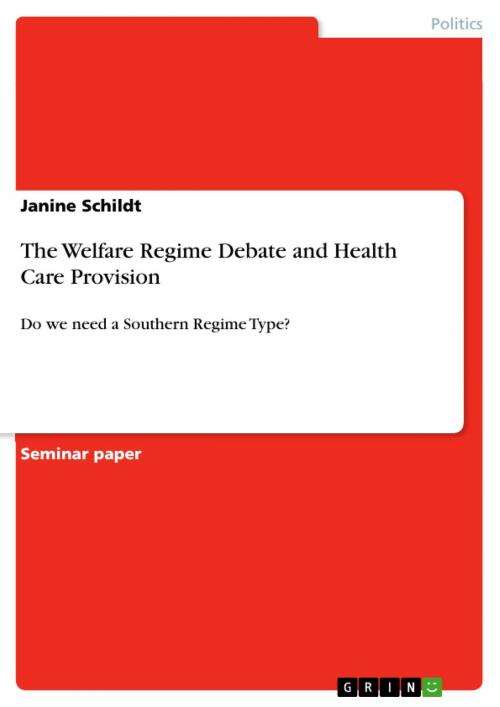The Welfare Regime Debate and Health Care Provision
Do we need a Southern Regime Type?
Nonfiction, Social & Cultural Studies, Political Science, Politics, History & Theory| Author: | Janine Schildt | ISBN: | 9783640730933 |
| Publisher: | GRIN Publishing | Publication: | October 21, 2010 |
| Imprint: | GRIN Publishing | Language: | English |
| Author: | Janine Schildt |
| ISBN: | 9783640730933 |
| Publisher: | GRIN Publishing |
| Publication: | October 21, 2010 |
| Imprint: | GRIN Publishing |
| Language: | English |
Seminar paper from the year 2010 in the subject Politics - Political Theory and the History of Ideas Journal, grade: 1,7, Hertie School of Governance, language: English, abstract: The welfare regime typology of the Danish sociologist Gøesta Esping-Andersen has become a modern social science classic and is widely used as a theoretical foundation for all kinds of research projects. However, his three-folded model differentiating regimes on the basis of welfare provision has also been challenged. Many studies have criticized Esping-Andersen for his non-acknowledgement of a Southern welfare regime including Greece, Spain, Portugal and Italy (...). Historic circumstances have produced fragmented welfare states which provide partly extensive state-led services, e.g. in health care, but have very limited benefits in other areas. The question remains whether 'the peculiarities of these cases are variations within a distinct overall logic [or] a wholly different logic per se', as Esping-Andersen (1999, p.90) has formulated it. Claire Bamba (2005) has challenged Esping-Andersen's welfare regime typology focusing on health care and identified two additional subcategories. Bamba argued that health care provision is a very distinguished feature of the welfare state and countries may follow a different logic in their health care services than they pursue in other branches of their welfare states (...). This paper argues that Southern countries can be included in Esping-Andersen's typology when looking at welfare areas independently and thus do not form an independent regime. The only clear difference they show is that their health care services and other areas of welfare state support follow different logics, which is also true for other countries such as the United Kingdom. Moreover, following Katrougalos (1996) it is argued that the distinctive features of Southern countries are based on the incompleteness of the development of their welfare states which have undergone considerable transformations in the last 30 years. The paper is structured as follows: Adjoining this introduction, the second chapter outlines Esping-Andersen's welfare typology, summarizes the most prominent criticisms and portraits the state of research on the Southern regime type. The third chapter gives overviews of the health care systems in Southern countries and compares them to see whether they really form a new welfare regime. The fourth chapter outlines Claire Bamba's decommodification index for health care and compares it to data from Southern countries while chapter five summarizes the findings and draws up a conclusion.
Seminar paper from the year 2010 in the subject Politics - Political Theory and the History of Ideas Journal, grade: 1,7, Hertie School of Governance, language: English, abstract: The welfare regime typology of the Danish sociologist Gøesta Esping-Andersen has become a modern social science classic and is widely used as a theoretical foundation for all kinds of research projects. However, his three-folded model differentiating regimes on the basis of welfare provision has also been challenged. Many studies have criticized Esping-Andersen for his non-acknowledgement of a Southern welfare regime including Greece, Spain, Portugal and Italy (...). Historic circumstances have produced fragmented welfare states which provide partly extensive state-led services, e.g. in health care, but have very limited benefits in other areas. The question remains whether 'the peculiarities of these cases are variations within a distinct overall logic [or] a wholly different logic per se', as Esping-Andersen (1999, p.90) has formulated it. Claire Bamba (2005) has challenged Esping-Andersen's welfare regime typology focusing on health care and identified two additional subcategories. Bamba argued that health care provision is a very distinguished feature of the welfare state and countries may follow a different logic in their health care services than they pursue in other branches of their welfare states (...). This paper argues that Southern countries can be included in Esping-Andersen's typology when looking at welfare areas independently and thus do not form an independent regime. The only clear difference they show is that their health care services and other areas of welfare state support follow different logics, which is also true for other countries such as the United Kingdom. Moreover, following Katrougalos (1996) it is argued that the distinctive features of Southern countries are based on the incompleteness of the development of their welfare states which have undergone considerable transformations in the last 30 years. The paper is structured as follows: Adjoining this introduction, the second chapter outlines Esping-Andersen's welfare typology, summarizes the most prominent criticisms and portraits the state of research on the Southern regime type. The third chapter gives overviews of the health care systems in Southern countries and compares them to see whether they really form a new welfare regime. The fourth chapter outlines Claire Bamba's decommodification index for health care and compares it to data from Southern countries while chapter five summarizes the findings and draws up a conclusion.















